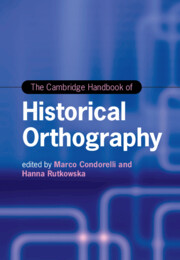Book contents
- The Cambridge Handbook of Historical Orthography
- cambridge handbooks in language and linguistics
- The Cambridge Handbook of Historical Orthography
- Copyright page
- Contents
- Figures
- Tables
- Contributors
- Abbreviations
- Part I Introduction
- Part II Structures and Theories
- Part III Organization and Development
- Part IV Empirical Approaches
- Part V Explanatory Discussions
- 21 Scribes and Scribal Practices
- 22 Orthographic Norms and Authorities
- 23 Networks of Practice across English and Dutch Corpora
- 24 Literacy and the Singular History of Norwegian
- 25 Authorship and Gender
- 26 Sociolinguistic Variables in English Orthography
- 27 Sociolinguistic Implications of Orthographic Variation in French
- 28 Orthography and Language Contact
- 29 Discourse and Sociopolitical Issues
- 30 Transmission and Diffusion
- 31 Analogy and Extension
- Bibliography
- Name Index
- Subject Index
22 - Orthographic Norms and Authorities
from Part V - Explanatory Discussions
Published online by Cambridge University Press: 28 September 2023
- The Cambridge Handbook of Historical Orthography
- cambridge handbooks in language and linguistics
- The Cambridge Handbook of Historical Orthography
- Copyright page
- Contents
- Figures
- Tables
- Contributors
- Abbreviations
- Part I Introduction
- Part II Structures and Theories
- Part III Organization and Development
- Part IV Empirical Approaches
- Part V Explanatory Discussions
- 21 Scribes and Scribal Practices
- 22 Orthographic Norms and Authorities
- 23 Networks of Practice across English and Dutch Corpora
- 24 Literacy and the Singular History of Norwegian
- 25 Authorship and Gender
- 26 Sociolinguistic Variables in English Orthography
- 27 Sociolinguistic Implications of Orthographic Variation in French
- 28 Orthography and Language Contact
- 29 Discourse and Sociopolitical Issues
- 30 Transmission and Diffusion
- 31 Analogy and Extension
- Bibliography
- Name Index
- Subject Index
Summary
This chapter explains that linguistic uniformity is rarely characteristic of nation-states. In Europe, official national languages brought powerful and ongoing consequences for ‘minority’ languages and their speakers. Nineteenth-century nation- and empire-building affected regional speakers of national languages, such as Flemish or Austrian German, or Afrikaans among other postcolonial varieties of European languages. Imposing European languages in settler nations has irrevocably endangered or eliminated Indigenous languages and cultures. The debates about European orthographic authorities surveyed in this chapter expose conflicting cultural allegiances and pedagogical needs. Vernaculars inherited diverse writing practices from different scholarly discourse communities, whether government chanceries or literary scriptoria or national language academies. Representative conflicts include tensions between scholarly traditions and simplified spellings for mass state education. Existing traditions can be difficult to displace, especially in democracies. Educators’ engagement with the state reminds us that pedagogy is often a matter of politics. Journalists can support or undermine proposed norms, whether using or reporting them. Successful reforms sometimes reflect intersections of low literacy and/or authoritarian states. Many debates that raged in the nineteenth century have continued into modern times. With the rise of social media, individuals can not only internalize but also influence and drive discourses of group identity.
- Type
- Chapter
- Information
- The Cambridge Handbook of Historical Orthography , pp. 436 - 456Publisher: Cambridge University PressPrint publication year: 2023



